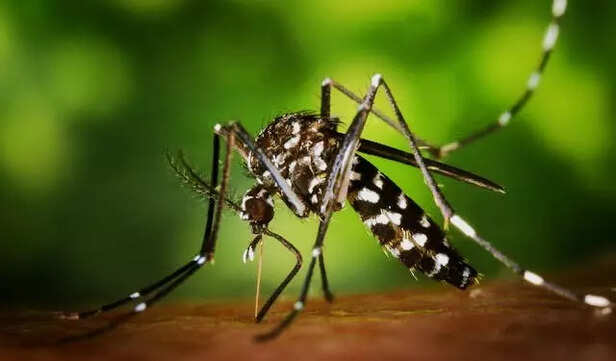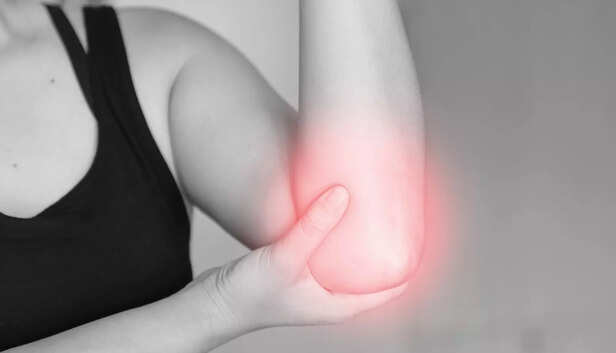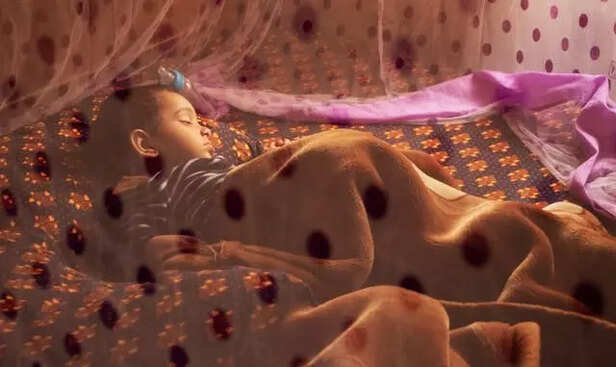China’s Mosquito Crisis: Why Chikungunya Is Exploding Now
Ritika | Aug 27, 2025, 15:52 IST
( Image credit : Timeslife )
A recent outbreak in China of the chikungunya virus is causing concern and prompting confusion as the disease takes hold with sudden speed, especially in Guangdong, a southern province. The virus is not new; however, the consequences it inflicts on the brain or heart, and how we tremendously struggle psychologically, are important too. Through this article, we’ll be discussing the chikungunya symptoms, causes, and treatment.
It may seem entirely ordinary in the beginning: a mosquito bite, slight fever, and possibly some joint pain. That mosquito bite, though, has become a very serious problem for thousands in China as of late. The chikungunya virus is resurfacing in China, after previously being confined to varying areas of South Asia and Africa, and Chinese health care authorities have been somewhat ambushed with the thousands of chikungunya cases reported in Guangdong province alone, to date. While chikungunya is not a fatal disease, it does come with a hefty price on one's health and peace of mind.
In some cases, the symptoms linger. In other cases, everyone simply feels afraid due to the incredible amount of uncertainty with whatever they have going on in their bodies. So no, this is not exactly a health report; this is a SERIOUS wakeup call.

Chikungunya is a viral disease that is contracted by the bite of infected Aedes albopictus mosquitoes, primarily Aedes aegypti and Aedes albopictus. These are the mosquitoes that transmit the dengue and Zika viruses. The name is derived from the chikungunya virus, initially discovered in 1952 in Tanzania (which means "that which bends up", referring to the posture of those afflicted by the disease, serious joint pain).
The disease, while prevalent throughout the tropics, had not been observed in the massive volumes that were in China. But with heavy rains and humid conditions this year, the conditions for mass breeding of mosquitoes were ideal; in cities like Foshan, mosquito control initiatives were being actively pursued that included fines for stagnant water and even utilizing fish and drones to eat the mosquitoes.

Chikungunya can be a low-key introduction. In fact, that is the very problem: there are too many people who confuse it with seasonal flu, or just plain tiredness from work. The virus does, however, have a distinguished fingerprint:

It may be "mild," but this can be an understatement for the person suffering from chikungunya disease, try this: Imagine if every morning you awoke in pain, and struggled to pick up your morning tea (not to forget getting out of bed), and you felt apprehensive as you did not know when, where or if it would ever end.
The outbreak in China, with the virus never previously seen in human beings, caused public panic. Foshan staff members have their patients wrapped in mosquito nets on beds, and not allowed to leave (until they see a negative test result or the end of the week-long stay). The emotional pain of being isolated and in doubt (and just plain hurting) counts and should not be discounted.

It may be one mosquito bite that started it all, but chikungunya's spread depends on a whole host of social and environmental factors:

Chikungunya antiviral therapy is not standard; instead, treatment is based on symptom management:
Chikungunya is certainly not an emerging disease, although it has a new location in China, and that is, of course, something to reflect on, as one should be more alert. A wake-up call to listen to your body, to the world, and to those invisible signs that something could seriously be wrong.
We need to be a little more cautious. Because whether you are living in an affected or non-affected zone, the message is particularly forceful: do not take the symptoms lightly; it is better to hurry up when feeling pain, and remember that a mosquito sting can completely change life, so be aware and stay safe.
Explore the latest trends and tips in Health & Fitness, Travel, Life Hacks, Fashion & Beauty, and Relationships at Times Life!
In some cases, the symptoms linger. In other cases, everyone simply feels afraid due to the incredible amount of uncertainty with whatever they have going on in their bodies. So no, this is not exactly a health report; this is a SERIOUS wakeup call.
1. What Is Chikungunya, and Why Is It Spreading in China Now?

Aedes albopictus mosquito
( Image credit : Pexels )
Chikungunya is a viral disease that is contracted by the bite of infected Aedes albopictus mosquitoes, primarily Aedes aegypti and Aedes albopictus. These are the mosquitoes that transmit the dengue and Zika viruses. The name is derived from the chikungunya virus, initially discovered in 1952 in Tanzania (which means "that which bends up", referring to the posture of those afflicted by the disease, serious joint pain).
The disease, while prevalent throughout the tropics, had not been observed in the massive volumes that were in China. But with heavy rains and humid conditions this year, the conditions for mass breeding of mosquitoes were ideal; in cities like Foshan, mosquito control initiatives were being actively pursued that included fines for stagnant water and even utilizing fish and drones to eat the mosquitoes.
2. Symptoms That Go Beyond the Surface

Joint pain
( Image credit : Pixabay )
Chikungunya can be a low-key introduction. In fact, that is the very problem: there are too many people who confuse it with seasonal flu, or just plain tiredness from work. The virus does, however, have a distinguished fingerprint:
- High fever (often sudden, or can get intense)
- Debilitating joint pain (primarily in hands, wrists, ankles, knees)
- Muscle aches and exhaustion
- Red, patchy rash (torso, limbs, face)
- Headaches and nausea
3. The Emotional Toll of a “Mild” Virus

A patient in bed
( Image credit : Pixabay )
It may be "mild," but this can be an understatement for the person suffering from chikungunya disease, try this: Imagine if every morning you awoke in pain, and struggled to pick up your morning tea (not to forget getting out of bed), and you felt apprehensive as you did not know when, where or if it would ever end.
The outbreak in China, with the virus never previously seen in human beings, caused public panic. Foshan staff members have their patients wrapped in mosquito nets on beds, and not allowed to leave (until they see a negative test result or the end of the week-long stay). The emotional pain of being isolated and in doubt (and just plain hurting) counts and should not be discounted.
4. Causes and Risk Factors: It’s Not Just About Mosquitoes

Stagnant drain water
( Image credit : Pixabay )
It may be one mosquito bite that started it all, but chikungunya's spread depends on a whole host of social and environmental factors:
- First, the climate/weather: warm and humid weather gives rise to more mosquitoes than colder weather can.
- Urbanization: densely populated urban places with ineffective drainage systems, fundamentally increase the breeding of Aedes mosquitoes.
- The matters of ignorance: most people do not even know the symptoms, or only listen to be told what they can do to prevent it.
- Travel: because there are more travels between places, there is more exposure.
5. Treatment and Prevention: What You Can Do

A baby sleeping inside mosquito net
( Image credit : Pexels )
Chikungunya antiviral therapy is not standard; instead, treatment is based on symptom management:
- Rest and hydration
- Analgesics and antipyretics (acetaminophen),
- No NSAIDs, e.g., ibuprofen, until dengue ruled out.
- Mosquito protection - long-sleeve tops, insect repellent, sleep under mosquito netting.
It’s Not Just a Virus, It’s a Reminder to Pay Attention
We need to be a little more cautious. Because whether you are living in an affected or non-affected zone, the message is particularly forceful: do not take the symptoms lightly; it is better to hurry up when feeling pain, and remember that a mosquito sting can completely change life, so be aware and stay safe.
Explore the latest trends and tips in Health & Fitness, Travel, Life Hacks, Fashion & Beauty, and Relationships at Times Life!
Frequently Asked Questions (FAQs)
- What to eat during Chikungunya?
It is important to have a diet rich in fruits vegetables and lean proteins in order to support the immune system during Chikungunya. - How long it takes to recover from chikungunya?
Usually, most patients recover well within a week, however, some symptoms like joint pain can last longer. - Can chikungunya spread from person to person?
Although chikungunya does not pass from one person to another, the mosquitoes can pick up the virus when they bite an infected person.
